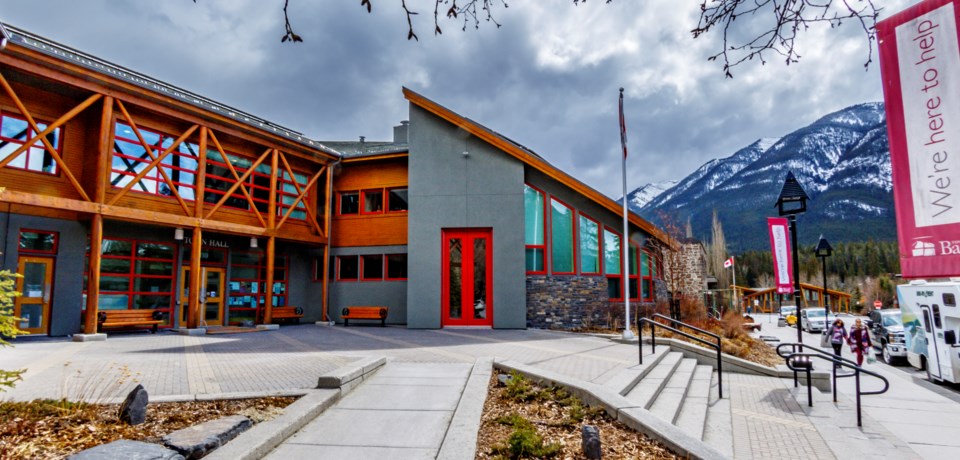BANFF – Banff has adopted a strategy that could lead to a ban or fee on certain single-use items.
Banff council has directed administration to implement several key actions, including the development of a bylaw to address single-use items and investigation of options to add conditions around takeaway food ware on business licences.
The strategy tackles more than just plastic items, but a range of one-time use items such as grocery bags, straws, containers, cups and cutlery. The goal is to stop using these items, rather than shift to other types of disposable products, which still may end up in the landfill stream.
Mayor Corrie DiManno said she was thrilled to be getting back to these discussions following postponement due to the COVID-19 pandemic, noting residents have spoken loud and clear that they want Banff to show environmental leadership.
“Banff wants to be a leader, not a follower, so I really love this made-in-Banff approach and I love that it puts us on the map in terms of moving the needle on our goals around waste diversion and zero waste to landfill,” she said.
“I really like that it’s going to be a collaborative community approach. We need to be doing this together and there needs to be buy-in from the community as a whole, so I am really glad that public consultation is a big piece to this.”
The Town of Banff and its council committed to waste diversion targets of 70 per cent by 2028 and zero waste to landfill by 2050 and the municipality sees the inclusion of local legislation as one of the necessary ways to achieve these targets.
Proposed regulatory measures include a ban on plastic checkout bags, with a minimum fee on paper and reusable bags; require reusable containers and cups for dine-in, but a mandatory fee for takeaway; require reusable utensils for dine-in, by request only for disposables; ban straws and stir sticks, with exception for accessibility requirements; and require reusable options for condiment sachets and by request only for disposables.
Carla Bitz, environmental coordinator for resource recovery for the Town of Banff, said an additional regulatory measure that administration wishes to examine further is adding conditions regarding takeaway food ware on business licences.
“This would be an additional way in which the Town could address the issue of single-use items upstream, ensuring that businesses who are granted an operating licence in Banff are required to provide to-stay food ware, accept BYO items, and participate in reuse programs,” she said. “This licence review could examine future and/or existing business licences.”
Banff’s initial list of items factors in those identified by the federal government in its proposed single-use plastics ban, items where there is a strong precedent set in other jurisdictions such as on plastic bags, while considering what single-use items are most problematic within Banff’s jurisdiction.
For example, Bitz said single-use disposable coffee cups are highly prevalent among many of Banff’s cafés and restaurants.
“They are something that many residents and visitors end up utilizing for convenience purposes and are a prolific source of waste and contamination in the Town’s pedestrian bins,” she said.
“Many businesses have made the investment to switch to compostable coffee cups which, at times, still, unfortunately, end up in the landfill.”
Bitz said it therefore makes sense that single-use disposable coffee cups are appropriate to be regulated as part of this strategy.
“Rather than banning a specific material such as polystyrene, the recommended regulatory mechanism is twofold: require reusables for dine-in and implement a mandatory fee on disposables,” she said.
“These measures are believed to be more effective at signalling a transition to reuse than a ban on a specific material would.”
Best practices from other jurisdictions were considered in the development of the strategy. However, Town administration recommends that Banff demonstrates leadership on single-use item reduction by going a step further than common practice to inspire change and demonstrate the sense of urgency that environmental issues like this one currently command.
Bitz said the strategy proposed is in keeping with the level of leadership that the Town of Banff aims to demonstrate with respect to zero waste and environmental issues.
“Implementing the actions would put Banff on par with or ahead of other jurisdictions that are tackling the challenge of single-use items,” she said.
On top of the proposed bylaw and look at business licences, other actions in the strategy include investing in opportunities that re-normalize reuse following the pandemic, demonstrating municipal leadership, public engagement with key stakeholders, and communications and education.
Council has allocated $10,000 from the environmental reserve to cover expenses associated with writing and reviewing the bylaw, along with public consultation.
Coun. Hugh Pettigrew voiced strong support for the strategy.
“The more we keep away from the landfill it will also pay us back in less travel and garbage or waste that cannot be recycled or gets mixed up,” he said. “I am supporting this 100 per cent.”
In terms of a timeline, the single-use Items bylaw, if eventually passed, will use a phased approach. Regulations would be placed first on ‘low-hanging fruit’ items, while businesses and residents would be given more time to adjust to changes for items that may be more challenging to avoid.
Bitz said the strategy also considers other upcoming steps focused on moving toward zero waste.
In particular, she said a material ban on sending food waste to landfills is anticipated in 2022, which is part of the municipality’s waste diversion targets and tactics strategy.
“The proposed timeline takes into account that many hospitality businesses including hotels, restaurants and food-service businesses will be impacted by this food ban as well,” she said.




